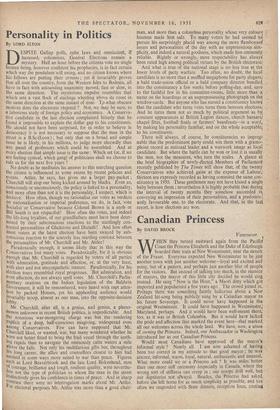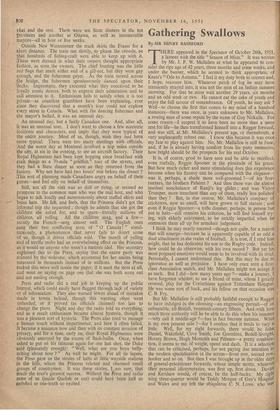Canadian Princess
By DAVID BROCK
Vancouver.
HEN they turned eastward again from the Pacifiq Coast the Princess Elizabeth and the Duke of Edinburgh boarded their train at New Westminster, near the mouth of the Fraser. Everyone expected New Westminster to be just anOther town with just another welcome—loyal and excited and noisy, but of a pattern, and perhaps just another blur of people, for the visitors. But instead of talking too much, in the manner of mayors, the mayor of this little city decided he would sing instead. He sang "Wow is the Hour," a Maori ditty which gob imported and popularised a few years ago. The crowd joined in, Perhaps there was something faintly ludicrous about a New Zealand hit-song being publicly sung by a Canadian mayor to his future Sovereign. It could never have happened in the original Westminster. It could have happened in Westminster,' Maryland, perhaps. And it would have. been well-meant there: too, as it was in British Columbia. But it would have lacked the pride and affection that marked the event here—that marked all our welcomes across the whole land. We have, now, a sense of owning the Princess. Indeed, our Ambassador in Washingtoa introduced her as our Canadian- Princess.
Would most Canadians have approved of the mayor's informal style ? Nearly all. I am now ashamed of havin4 been too correct in my attitude to that good mayor ; he was .sincere, informal, warm, loyal, natural, enthusiastic and unusual; What more could we or a Princess ask ? It was miles better than one more 'stiff ceremony (especially in Canada, where the wrong sort of stiffness can creep in ; our troops drill well, but our dignitaries not altvays). Besides, the Princess had asked, before she left home for as much simplicity as possible, and toe; often we responded with State dinners, reception lines, routinci chat and the rest. There were ten State dinners in the (en 'provinces and another at Ottawa, as well as innumerable mayors—all in four or five weeks.
Outside New Westminster the track skirts the Fraser for a Short distance. The train ran slowly, to please the crowds, so that hundreds of fishing-craft were able to keep up with it. These were dressed in what their owners thought appropriate fashion, as were the owners. The chief bunting was the little led flags that mark either end of a gill-net, but they were gay enough, and the fishermen gayer. As the train turned across the bridge, the fishermen spontaneously • danced upon their 'decks. Impromptu, they executed what they conceived to be loyally comic dances, both to express their admiration and to call attention to it. Enthusiasm fails to satisfy when it is too private—as countless grumblers have been explaining, ever since they discovered that a month's tour could not explore every street in Canada. What with the dancing fishermen and the mayor's ballad, it was an unusual day.
An unusual day, but a fairly Canadian one. And, after all, ft was an unusual tour. I don't want to choose a few eccentric incidents and characters, and imply that they were typical of the entire journey. Most of us, though, wish they had been more typical. There were too many meetings with officials. And the worst day at Montreal involved a trip miles outside the city, at six in the evening, to see an aircraft factory. Their Royal Highnesses had been kept hopping since breakfast with such things as a 70-mile " goldfish ' tour of the streets, and they had a State dinner as soon as they returned from the factory. Why not have had two hours' rest before the dinner ? This sort of planning made Canadians angry on behalf of their guests—and feel silly on behalf of themselves.
Still, not all the visit was so dull or tiring, or seemed so pompous to the common man who was the real host, and who began to talk loudly and monotonously about stuffed shirts and brass hats. He felt, and feels, that the Princess didn't get the informal trip she requested ; though he admits that she got the children she asked for, and to spare—literally millions of children, all yelling. All the children sang, and a few— mostly the French—sang almost well. The English ones sang their two conflicting texts of "0 Canada!-" simul- taneously, a phenomenon that never fails to divert some of us, though it drives officials wild. The month of yelling and of terrific mobs had an overwhelming effect on the Princess, as it would on anyone who wasn't a matinee idol. Her secretary explained this to the Press, saying that the entire party was stunned by the Welcome, Which accounted for her smiles being measured in thousands instead of in millions. But the Press tucked this news well inside the paper, if it used the item at all, and went on saying on page one that she was both worn out and not smiling enough.
Press and radio did a real job in keeping up the public interest, which could easily have flagged through lack of variety or of information. They also warned towns ahead' of mistakes made in towns behind, though this warning often went unheeded, or it proved (as officials claimed) toot late to change the plans. Night and day the radio told us everything, and as a result enthusiasm became almost hysteria, though it was a pleasant sort of hysteria. The Press also tried to manage a human touch without impertinence, and here it often failed. It became a nuisance now and then with its constant invasion of privacy, and for a time, early on, their Royal Highnesses were obviously annoyed by the excess of flash-bulbs. Once, when asked to put on his raincoat again for one last shot, the Duke said (pleasantly enough): "Well, what are you boys belly- aching about now ? " As well he might. For all its lapses, the Press gave us the stories of halts at little wayside stations in the hills, where the Princess relaxed and charmed small groups of ceuntrymen. It was these stories, I . am sure, that stiade the tour's greatest success. Without the Press and radio none of us (inside Quebec or out) could have been half so patisfied or one-tenth so excited.















































































 Previous page
Previous page